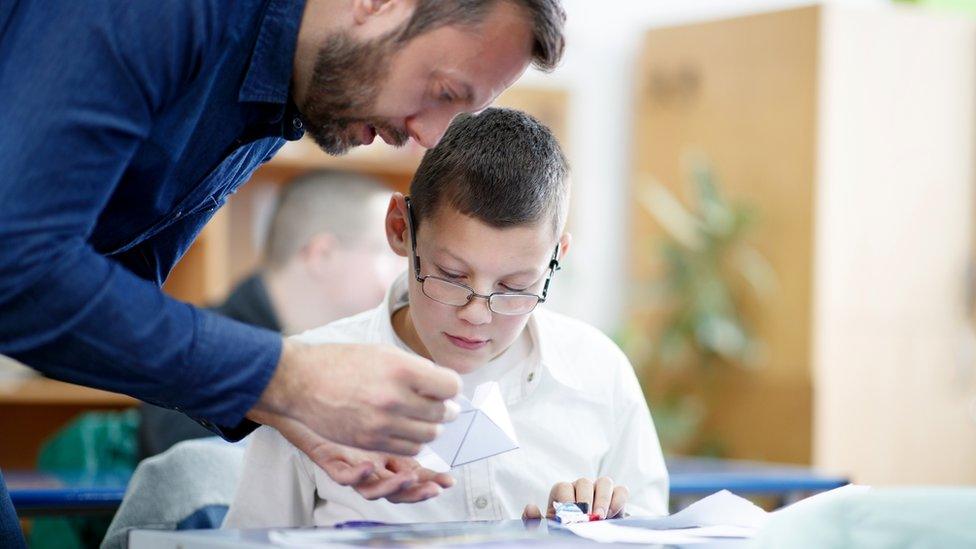NI Education: Early special educational needs support 'almost impossible'
- Published

Providing early support for children with special educational needs (SEN) is "almost impossible" in Northern Ireland, a major review has found.
The review also said the cost of funding SEN - including support for children, special schools and transport - had rocketed to around £500m a year.
The role of classroom assistants needs to be reformed, it recommended.
The review was commissioned by the Department for Education in 2022 and carried out by Ipsos.
The current system is "not perceived to be an efficient way of supporting children", it added.
The review followed a number of highly critical reports into Education Authority (EA) support for children with SEN.
How many children have SEN?
In 2022-23 more than 66,000 pupils in Northern Ireland had some form of SEN - just under 20% of the school population.
Of those, more than 24,000 had a statement - a legal document setting out the child's needs and how these should be met in school.
About 7,000 pupils are educated in 39 special schools in Northern Ireland, with about 4,000 others in specialist classes in mainstream schools.
But there are already concerns that there were will be a "significant shortfall" in school places for children with SEN this September.

Laura O'Hanlon with her son Matthew
Laura O'Hanlon, whose son Matthew has autism and is in P1, said there seems to be a "copy and paste" approach towards special education.
"Children are going into school really with nothing specific going down on paper as in how to meet their needs and teachers and classroom assistants have nothing really to go on," she told BBC NI's Evening Extra.
"I have sent countless emails to the Education Authority that I have never got replies to."
Confidence boost
Tracy McIntee's daughter Erin has autism spectrum disorder.
Her classroom assistant is leaving at the end of this term and she said she has no idea what will be in place in September.
"If Erin knows her classroom assistant is in the school - may not even be in the room - if she knows she's about that really gives her a lot of confidence," she said.
The review of SEN services said it was clear that the system needed to be reformed "to move from a process driven system to a child-centred approach".
School principals, civil servants, parents and young people were among those the report's authors interviewed.
It highlighted a wide range of problems and challenges.
Demand for support for pupils has rocketed while there are fewer specialist staff to deliver it.
The review found that the number of educational psychologists in the Education Authority had fallen by more than a quarter from 136 in 2016 to 101 in 2021.

The review said assigning classroom assistants on a one-to-one basis is not perceived to be an efficient way of supporting children
"Our major challenge is the access to educational psychologists, we have over 1,300 children, only three can get assessed each year," one teacher is quoted as saying.
"We see lots of kids who have dyslexia, but we can't get them assessed, so then they can't access the service."
That is not a view shared by everyone, but there is certainly a lot that needs to be fixed.
The review also said that the "majority of pre-schools cannot request an assessment by an educational psychologist and have limited access to the EA supports".
"Under the current system and processes early intervention is almost impossible," it added.
By contrast, the numbers of classroom assistants employed to support children with SEN had risen by 40% from 4,740 in 2017 to around 6,700 in 2022.
But the review said their role, training and deployment needed reform.
"Assigning classroom assistants (CAs) on a one-to-one basis is not perceived to be an efficient way of supporting children, unless they have a physical or medical need," it said.
"This does not help children develop independence and is not the most effective way to help pupils meet their learning goals.
"Often CAs are appointed on a short-term basis meaning that it is difficult to attract and retain good quality staff."
'Transformational change'
Marianne Buick, a spokesperson for Unison which represents thousands of classroom assistants, said they would be hurt by the comments in the report.
She said morale among classroom assistants was low and that they were doing above and beyond their roles in the school.
The review added that the rising costs of providing support for SEN were "rapidly increasing and unsustainable".
The overall cost of SEN support in 2022-23 was £490m, almost double what it was in 2017-18.
The review, however, was not able to determine exactly why the level of SEN in Northern Ireland was so high, and why the number of children with complex needs was also increasing.
The Department of Education said it would form the basis for "transformational change of the SEN system in Northern Ireland".
The EA meanwhile, said that it was "essential that there is a sustainable funding model for education that will allow us to invest in our children and young people with special educational needs and disabilities".
Related topics
- Published8 May 2023

- Published12 October 2022

- Published15 April 2022
